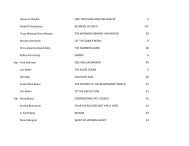nonfiction
nonfiction
nonfiction
You also want an ePaper? Increase the reach of your titles
YUMPU automatically turns print PDFs into web optimized ePapers that Google loves.
“With measured verve, McAuliffe<br />
presents an accessible text that occasionally approaches<br />
Barbara Tuchman’s talented touch.”<br />
from clash of crowns<br />
unpleasant terms). The intensity of his combat experience has<br />
clearly stayed with him all his life; recalling friends he never<br />
saw again after certain battles, he notes, “I suppose dying is just<br />
another way of saying good-bye.” The author is disarmingly honest,<br />
as when the young soldier-protagonist visits a prostitute in<br />
order to lose his virginity before shipping out, and particularly in<br />
his vivid recollections of an oddly idyllic Depression adolescence<br />
in Queens, with no clue of the storm that lay ahead: “Where in<br />
the hell is Pearl Harbor Nobody had the foggiest that 108,504 U.S.<br />
servicemen would have to die…to answer that question, to make<br />
things right.” Mace describes the war in tactile, often gruesome<br />
terms, suggesting that the Pacific campaign was remarkably filthy<br />
and grueling, as when he encountered “Japanese corpses [that]<br />
have congested this open area with open wounds, glossy red tripe<br />
boiling from naked bellies.” The tough-guy prose recalls James<br />
Ellroy, but the first-person perspective suggests authenticity with<br />
regard to the little-understood experience of the frontline rifleman<br />
in the Pacific theater. Young Marines like Mace contended<br />
not only with a formidable and little-seen enemy, but also with<br />
military bureaucracy, inter-service rivalries, supply problems and<br />
an unbearable physical environment. The author mingles increasingly<br />
dark humor with terror at the seeming randomness of violent<br />
death in war, yet the narrative also dramatizes the diverse<br />
humanity of the ordinary Americans who were sucked into the<br />
conflict. The book culminates in a poignant scene in which Mace<br />
visits the mother of a close friend who died in battle.<br />
A mostly valuable testimonial of the Pacific campaign’s<br />
desperate brutality—will appeal to fans of The Pacific or<br />
Band of Brothers.<br />
SUPERFUEL<br />
Thorium, the<br />
Zero-Risk Energy<br />
Source for the Future<br />
Martin, Richard<br />
Palgrave Macmillan (272 pp.)<br />
$27.00 | May 8, 2012<br />
978-0-230-11647-4<br />
The story of the slightly radioactive<br />
element thorium, a much-touted alternative<br />
fuel for nuclear power plants.<br />
Abundant in the Earth’s crust, thorium has been used in<br />
various industrial processes since its discovery in 1828. Advocates,<br />
writes Martin, an award-winning journalist and editorial director<br />
for Pike Research, a clean energy firm, say the silver-gray element<br />
has another possible use: as an cheap, safe energy source<br />
with the potential to “solve our power crisis.” Expanding on his<br />
Wired cover story, the author explains that the element was actually<br />
used as a nuclear fuel in an experimental reactor built and<br />
run by American scientists at Oak Ridge in the late 1960s. Since<br />
then, it has become a forgotten technology, losing out to uranium,<br />
which powers all reactors operating in the United States.<br />
In the wake of Japan’s recent Fukushima Daiichi disaster, many<br />
scientists and entrepreneurs are now seeking U.S. government<br />
and corporate backing of thorium, which has become the fuel of<br />
choice for nuclear energy efforts in India, Japan and elsewhere.<br />
Martin focuses on the work of Kirk Sorensen, a former NASA<br />
engineer, now head of Flibe Energy, who urges U.S. utilities that<br />
are preparing to replace some 30 older reactors to build a new<br />
kind of reactor—a liquid-fluoride thorium reactor, which proponents<br />
consider to be more efficient and safer than existing plants.<br />
He describes how uranium-based nuclear reactors came to<br />
dominate the nuclear industry and how industry leaders are now<br />
thwarting the use of thorium power, while conceding its possible<br />
advantages. They complain of the high costs associated with converting<br />
to the alternative energy source. Martin also details Asia’s<br />
enthusiasm for thorium power and its implications for reducing<br />
reliance on fossil fuels and slowing climate change.<br />
A lucid overview of a still-developing chapter in the<br />
story of nuclear power.<br />
HILARITY ENSUES<br />
Max, Tucker<br />
Blue Heeler Books (448 pp.)<br />
$25.99 | Feb. 7, 2012<br />
978-1-4516-6903-9<br />
Expensively educated child-of-privilege-turned-professional-asshole<br />
Max<br />
(Assholes Finish First, 2011, etc.) ends his<br />
“fratire” series with another memoir full<br />
of binge drinking, upchucking and general<br />
unhinged misanthropy.<br />
Here the author cuddles up next to blowhard Bill O’Reilly,<br />
crackpot psychologists, Hollywood gossips and psychotic Army<br />
snipers. There are also plenty of repetitious barhopping stories<br />
involving Max and the angry gynophobes he hangs with, all out<br />
for some good old-fashioned recreational hate sex (or often just<br />
hate, period) with clueless sorority-type chicks. The Tucker Max<br />
formula for success He interacts with people who have the rare<br />
disability of being even more moronic than he is—and so-called<br />
hilarity ensues. Beyond the predictable mouthing off about his<br />
“awesome” life, in this latest book we also get sections featuring<br />
Max’s boring “sexting” transcripts, a self-righteous diatribe<br />
against the mother of Miss Vermont (who sued him for libel),<br />
some routine white-trash strip-club experiences and a proud<br />
recollection of the time he beat up a frail European guy. There’s<br />
also a fond remembrance of his homosocial maritime bromance<br />
with one of the macho crab fisherman of Deadliest Catch fame:<br />
Although he vomited from seasickness during much of his Alaskan<br />
fishing expedition, he seemed to be much more at ease with<br />
the rough boys on the Time Bandit than with the unfortunate<br />
females he hits on in yuppie bars. We also learn some further<br />
startling new information about the author—he likes Southern<br />
rap and hates the French! Although there’s no telling how<br />
much honesty there is behind any of Max’s chauvinist bluster,<br />
undoubtedly the most believable statement in the book comes<br />
in the penultimate chapter, where he reveals the fact that he has<br />
no girlfriend or wife. Shocking.<br />
The 18-year-old fraternity pledge’s guide to life.<br />
CLASH OF CROWNS<br />
William the Conqueror,<br />
Richard Lionheart, and<br />
Eleanor of Aquitaine—<br />
a Story of Bloodshed,<br />
Betrayal, and Revenge<br />
McAuliffe, Mary<br />
Rowman & Littlefield (248 pp.)<br />
$26.00 | $25.99 e-book | Apr. 1, 2012<br />
978-1-4422-1471-2<br />
978-1-4422-1473-6 e-book<br />
A recovery from romantic fable of some of the brightest<br />
stars of Western medieval history.<br />
Among the many notables, McAuliffe (Dawn of the Belle<br />
Epoque: The Paris of Monet, Zola, Bernhardt, Eiffel, Debussy, Clemenceau,<br />
and Their Friends, 2011, etc.) reintroduces us to the likes<br />
of William the Conqueror, Barbarossa, Rollo the Viking, Robert<br />
Curthose of Normandy, Louis the Fat and a cadre of Henrys.<br />
(Readers will have no problem keeping them straight—the<br />
author appends a table of key people and a helpful chronology).<br />
After assessing the famously dysfunctional English household<br />
of Henry II and Eleanor of Aquitaine, McAuliffe focuses on<br />
the truly excellent adventures of their son, Richard Lionheart.<br />
In clear prose, the author examines Richard’s internecine<br />
struggles, usually with his brother, his feckless Third Crusade<br />
fighting Saladin and his many clashes with archenemy Philip of<br />
France. In these eclectic pages, we learn of 12th-century statecraft,<br />
the design of fortress castles and how to lay siege to them,<br />
the wages of mounted knights and foot soldiers, the rise of the<br />
notion of romance and the wonderful victuals consumed at<br />
great state dinners. The author weaves a selective tapestry that<br />
does not scant personal qualities of her featured players. She<br />
reveals the Conqueror’s baldness and staunch Eleanor’s attractions.<br />
Also, it appears that Lionheart may have been gay, according<br />
to the author’s research.<br />
With measured verve, McAuliffe presents an accessible<br />
text that occasionally approaches Barbara Tuchman’s talented<br />
touch.<br />
CALL OF THE MILD<br />
Learning to Hunt<br />
My Own Dinner<br />
McCaulou, Lily Raff<br />
Grand Central Publishing (336 pp.)<br />
$24.99 | Jun. 12, 2012<br />
978-1-4555-0074-1<br />
Eloquent debut memoir about a young<br />
woman’s transformation from a New York<br />
City urbanite into a small-town Oregon<br />
hunter with a conscience.<br />
In her mid 20s, journalist McCaulou suddenly found that<br />
her job as an independent film production assistant had lost its<br />
charm. While the work put her in contact with indie stars and<br />
“fun, artsy people” all over New York City, she couldn’t get away<br />
from the feeling that what she was doing was “one big, glitzy<br />
distraction.” On a whim, McCaulou accepted a job at a Bend,<br />
Ore., newspaper. She thought the experience would offer her<br />
a much-needed change of scenery and a new arsenal of journalistic<br />
skills. What she discovered was a lifestyle that, though “a<br />
distant cousin” to the one she had known, proved far more satisfying<br />
than anything she imagined. As she learned to fly-fish,<br />
McCaulou wrote articles about natural resources and the environment.<br />
One topic that intrigued her was hunting, which she<br />
had long associated with cruel and indiscriminate killing. The<br />
more she researched this sport, the more she came to believe<br />
that true hunters, as opposed to poachers, were really “environmentalist<br />
role models.” To better understand their lifestyle,<br />
McCaulou decided to take up the sport herself. She gradually<br />
grew to appreciate hunting for what it taught her about her relationship<br />
to the wilderness. Killing, and eating, a hunted animal<br />
created an intimate bond between her, another creature and, by<br />
extension, the land on which that creature lived. Throughout<br />
the book, the author shares her mostly profound insights.<br />
A powerful story in which the author shapes a narrative<br />
of personal growth into a symbol of modern humanity’s<br />
alienation from the natural world.<br />
ROAD TO VALOR<br />
A True Story of World<br />
War II Italy, the Nazis,<br />
and the Cyclist Who<br />
Inspired a Nation<br />
McConnon, Aili and McConnon, Andres<br />
Crown (352 pp.)<br />
$25.00 | Jun. 12, 2012<br />
978-0-307-59064-0<br />
Mostly uplifting account of the Tuscan<br />
champion cyclist whose prime was<br />
ruptured by the advent of World War II.<br />
The extent of Gino Bartali’s work as a courier of forged<br />
documents for Jews hiding in Tuscany has only recently gained<br />
the cyclist, who died in 2000, humanitarian recognition. The<br />
scrappy laborer’s son was 24 when he won his first Tour de<br />
France in 1938, his best years subsequently interrupted by military<br />
service when war broke out and Mussolini’s Italy was allied<br />
with Nazi Germany, yet he made his incredible comeback and<br />
won the race again for a war-defeated Italy in 1948. The McConnons—former<br />
BusinessWeek writer Aili and filmmaker Andres—<br />
have sifted through the archives and interviewed Bartali’s<br />
widow, family and former teammates. With his simple peasant<br />
beginnings in the Tuscan village of Ponte a Ema, Bartali and his<br />
younger brother, Giulio, found in cycling races around their<br />
native mountains an opportunity for distinction and money.<br />
After winning the Giro d’Italia in 1936, Bartali almost quit racing<br />
following Giulio’s fatal accident, but meeting the young woman<br />
who would become his wife, Adriana Bani, encouraged him to<br />
strive on, and he won another Giro in 1937. He was manipulated<br />
by Mussolini’s national sports directors to concentrate solely on<br />
the Tour de France; however, because of his alliance with the<br />
826 | 15 april 2012 | <strong>nonfiction</strong> | kirkusreviews.com |<br />
| kirkusreviews.com | <strong>nonfiction</strong> | 15 april 2012 | 827






